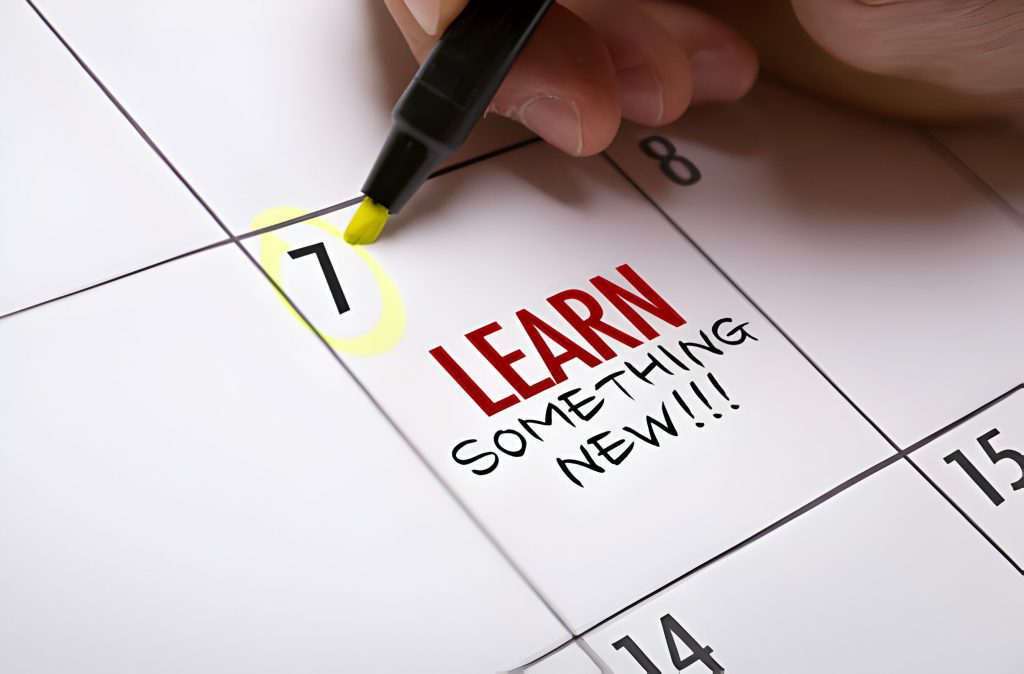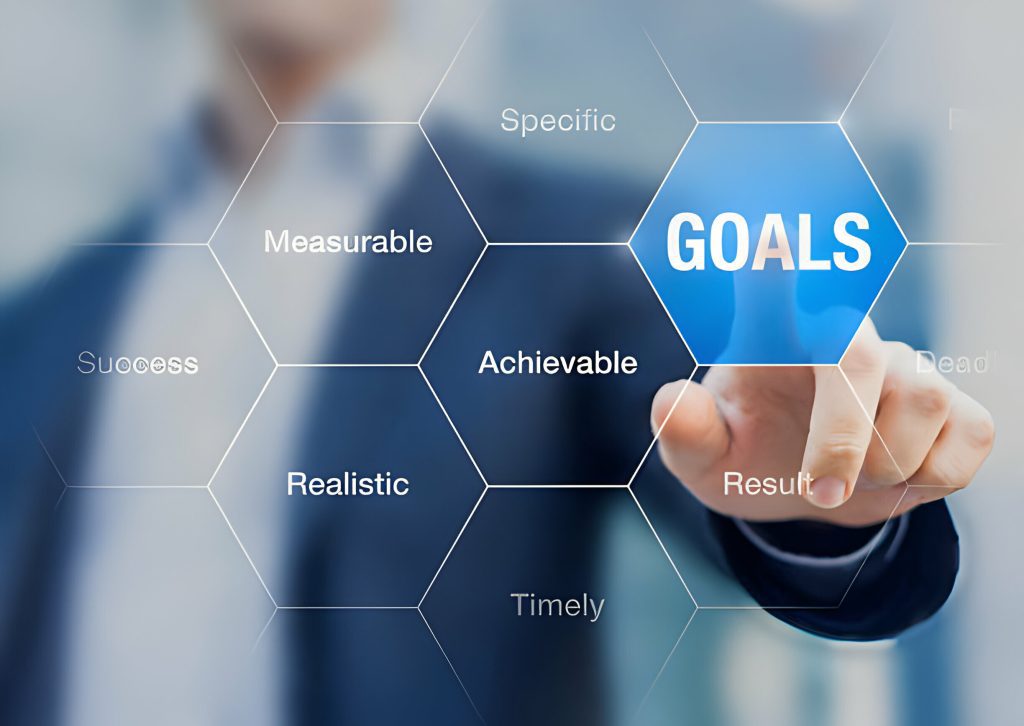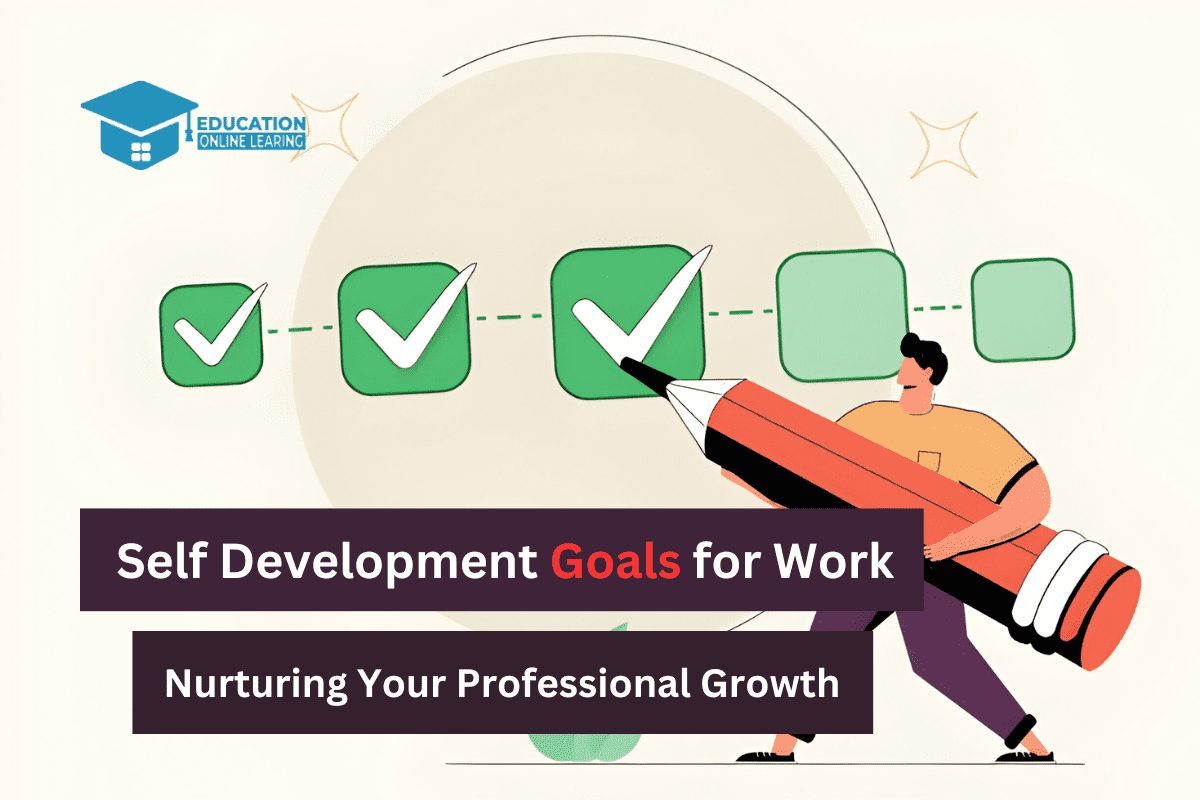Self Development Goals for Work

Self-development is a journey of continuous improvement, especially in the context of the workplace. As we strive for success and fulfillment in our professional lives, setting self-development goals becomes instrumental. This article will guide you through the process of identifying, setting, and achieving self-development goals tailored to your work environment. [Self Development Goals for Work.]
Importance of Self-Development at Work
Self-development is not just a personal endeavor; it profoundly impacts your professional life. By investing in your growth, you not only enhance your skills but also contribute positively to your workplace.
Personal and Professional Growth
Taking intentional steps toward self-improvement leads to holistic growth. It not only sharpens your professional skills but also nurtures personal attributes, fostering a well-rounded and resilient individual.
Increased Job Satisfaction
Setting and achieving self-development goals often leads to a sense of accomplishment and increased job satisfaction. As you conquer challenges and reach milestones, your work becomes more fulfilling.
Career Advancement
Employers value individuals committed to continuous improvement. They are setting self-development goals to position you as someone proactive and dedicated to staying relevant in your field, opening doors to career advancement opportunities.
Identifying Your Strengths and Weaknesses
To embark on a journey of self-development, start by identifying your strengths and weaknesses. This requires honest self-reflection and a willingness to accept constructive feedback from colleagues and superiors.
Self-Reflection
Take time to assess your skills, experiences, and areas for improvement. What are your strengths that you can leverage, and what areas need enhancement? Reflecting on your professional journey provides insights into potential areas of focus. [Self Development Goals for Work.]
Utilizing Feedback
Seeking feedback from colleagues and supervisors provides an external perspective on your strengths and weaknesses. Constructive feedback is a valuable tool for self-discovery and can guide you in setting realistic self-development goals.
Setting SMART Goals

Once you clearly understand your strengths and weaknesses, it’s time to set Specific, Measurable, Achievable, Relevant, and Time-Bound (SMART) goals. [Self Development Goals for Work.]
Specific
Clearly define what you want to achieve. Instead of a vague goal like “improve communication,” specify “enhance verbal communication skills in team meetings.”
Measurable
Establish measurable criteria to track your progress. This could include metrics, timelines, or milestones that signify advancements in your self-development journey.
Achievable
Ensure your goals are realistic and attainable. Setting overly ambitious goals may lead to frustration, while achievable goals boost confidence and motivation.
Relevant
Align your goals with your overall professional objectives. Your self-development goals should contribute to your career growth and fulfillment.
Time-Bound
Set a timeline for achieving each goal. Having a deadline creates a sense of urgency and helps you stay focused on your objectives.
Enhancing Skillsets
Continuous learning is at the core of self-development. To stay relevant in your industry, consider the following strategies.
Continuous Learning
Embrace a mindset of continuous learning. Keep up with developments, trends, and best practices in the field. To increase your knowledge, go to conferences, seminars, and workshops. [Self Development Goals for Work.]
Professional Development Courses
Enroll in courses relevant to your field. Online platforms offer a plethora of courses ranging from technical skills to leadership development. Identify areas where you can enhance your expertise and invest in specialized courses. [Self Development Goals for Work.]
Time Management

Effective time management is crucial for achieving self-development goals amidst work responsibilities.
Prioritizing Tasks
Identify tasks based on their importance and urgency. Prioritize high-impact activities that align with your goals to ensure steady progress. [Self Development Goals for Work.]
Avoiding Procrastination
Procrastination is a common obstacle in achieving self-development goals. Break down tasks into smaller, manageable steps, and tackle them systematically to overcome procrastination.
Building Effective Communication Skills
Clear communication is a cornerstone of professional success. Pay attention to your written and spoken communication abilities. [Self Development Goals for Work.]
Verbal and Written Communication
Enhance your ability to articulate ideas clearly. Practice concise and effective verbal communication, and pay attention to written communication, ensuring clarity and professionalism in emails and reports.
Active Listening
Effective communication involves active listening. Cultivate the habit of fully engaging in conversations, understanding perspectives, and responding thoughtfully.
Networking and Relationship Building
Networking is not only about expanding your professional circle but also about building meaningful relationships. [Self Development Goals for Work.]
Internal and External Networking
Build connections within your organization and industry. Attend networking events, engage in professional groups, and connect with colleagues to create a robust professional network.
Mentorship
Seek mentorship opportunities. A mentor can provide guidance, share experiences, and offer valuable insights into your chosen field. [Self Development Goals for Work.]
Balancing Work and Life
Achieving self-development goals requires a harmonious balance between work and personal life.
Avoiding Burnout
Prioritize self-care to prevent burnout. Ensure sufficient breaks, exercise, and leisure time to maintain overall well-being. [Self Development Goals for Work.]
Maintaining a Healthy Work-Life Balance
Set boundaries to maintain a healthy work-life balance. Establish clear distinctions between work hours and personal
time to rejuvenate and recharge. [Self Development Goals for Work.]
Adapting to Change
Flexibility and resilience are key attributes in the dynamic work environment.
Flexibility
Embrace change with an open mind. Be flexible in adapting to new technologies, methodologies, and responsibilities. [Self Development Goals for Work.]
Resilience
Develop resilience to bounce back from setbacks. Learn from challenges, view them as opportunities for growth, and maintain a positive mindset.
Tracking Progress
Regularly assess your progress to stay on course and make necessary adjustments.
Regular Assessments
Schedule periodic assessments of your goals. Analyze your achievements, identify areas for improvement, and adjust your self-development plan accordingly. [Self Development Goals for Work.]
Adjusting Goals as Needed
Be flexible in adjusting your goals. As circumstances change, your self-development plan should evolve to meet new challenges and opportunities.
Celebrating Achievements
Acknowledge your accomplishments along the way to stay motivated.
Acknowledging Milestones
Celebrate small victories and milestones. Recognize the effort you put into achieving each goal, reinforcing a positive attitude toward your self-development journey. [Self Development Goals for Work.]
Use achievements as motivation for further growth. The sense of accomplishment from reaching goals propels you toward more significant challenges and aspirations. [Self Development Goals for Work.]
Overcoming Challenges
Challenges are inherent in self-development; the key is to view them as stepping stones rather than obstacles. [Self Development Goals for Work.]
Learning from Setbacks
Instead of viewing setbacks negatively, consider them as learning experiences. Identify lessons from challenges to inform your future decisions.
Turning Obstacles into Opportunities
Turn obstacles into opportunities for growth. Each challenge presents a chance to develop resilience, problem-solving skills, and a deeper understanding of your capabilities.
Balancing work and life, building effective communication skills, and overcoming challenges contribute to a holistic approach to self-development. Celebrate your achievements, stay resilient in the face of challenges, and let your self-development journey be a testament to your dedication to growth.
Self development goals for work examples
Embarking on a journey of self-development in the workplace involves setting meaningful and achievable goals that contribute to both personal and professional growth.
Examples of self-development goals for work span various aspects of one’s professional life. These may include enhancing communication skills to foster better collaboration with colleagues, acquiring new technical skills to stay abreast of industry trends, and setting specific career milestones, such as obtaining certifications or reaching leadership positions.
Time management goals, like prioritizing tasks efficiently, and goals centered around fostering a positive work environment through effective teamwork and leadership are also common. Each individual’s path is unique, but these examples showcase the diversity of self-development goals that can lead to a more fulfilling and successful professional life. [Self Development Goals for Work.]
Personal Development Plan for Work Examples
Crafting a personal development plan for work is a strategic approach to fostering continuous growth and success in one’s professional journey. [Self Development Goals for Work.]
A well-thought-out plan may include honing specific skills relevant to the job, such as mastering new software or improving public speaking abilities.
Setting goals for career advancement, such as taking on leadership roles or participating in cross-functional projects, can also be integral to personal development. [Self Development Goals for Work.]
Embracing challenges and seeking opportunities to step out of one’s comfort zone is another facet of a robust plan, fostering adaptability and resilience. Moreover, nurturing a healthy work-life balance, developing emotional intelligence, and prioritizing well-being contribute to overall personal and professional success.
A comprehensive personal development plan tailors these examples to an individual’s aspirations, creating a roadmap for continuous improvement in the workplace. [Self Development Goals for Work.]
Personal Goals for Work Examples
Personal goals for work are instrumental in guiding individuals toward professional success and satisfaction. Examples of such goals may include refining time management skills to boost productivity and setting clear and achievable career milestones, such as securing a promotion or completing a certification relevant to one’s field.
Enhancing communication skills, both verbal and written fosters effective collaboration and leadership. Personal development in the workplace can also involve cultivating a positive mindset, managing stress, and fostering a healthy work-life balance.
Setting goals for networking and building professional relationships can open doors to mentorship opportunities and career growth. Overall, personal goals in the workplace are diverse and cater to an individual’s aspirations, contributing to a fulfilling and purpose-driven professional life.
Personal Goals for Work Evaluation
Evaluating personal goals for work is a critical step in gauging professional development and ensuring alignment with overarching career aspirations. Conducting a thorough self-assessment allows individuals to measure progress toward set goals.
This evaluation involves reflecting on achievements, identifying areas of improvement, and acknowledging challenges faced. Analyzing the impact of attained goals on job performance, skill enhancement, and overall job satisfaction provides valuable insights.
Additionally, seeking feedback from supervisors, peers, or mentors aids in gaining an external perspective and offers constructive insights for continuous improvement.
Regularly assessing personal goals in the context of professional growth contributes to a dynamic and adaptive approach to career development, fostering resilience and a commitment to ongoing improvement.
Smart Self Development Goals for Work
Smart self-development goals for work are a strategic framework designed to guide individuals toward meaningful and achievable professional growth. The SMART acronym stands for Specific, Measurable, Achievable, Relevant, and Time-bound, emphasizing the importance of clarity and precision in goal-setting.
Specific goals outline precisely what is to be accomplished, Measurable criteria provide a tangible way to track progress, and Achievable goals ensure that they are realistic and attainable.
Relevant goals are aligned with one’s overall career objectives, and Time-bound constraints establish deadlines for completion.
By adopting SMART self-development goals, individuals gain a focused and structured approach, promoting clarity, motivation, and a higher likelihood of success in their professional advancement endeavors.
Personal Development Examples in real life
Personal development is a lifelong journey of self-improvement, and examples in real life abound, showcasing the transformative power of intentional growth.
One common example is the commitment to continuous learning, whether through formal education, workshops, or self-directed study.
Embracing challenges and stepping out of one’s comfort zone, such as taking on new responsibilities at work or pursuing a passion project, is another impactful instance of personal development.
Developing effective communication skills, building resilience in the face of setbacks, and fostering emotional intelligence are essential components seen in real-life personal growth. Additionally, cultivating a healthy work-life balance, practicing mindfulness, and setting and achieving fitness goals contribute to holistic personal development.
Real-life examples highlight that personal development is not a one-size-fits-all journey; it is a dynamic process tailored to individual aspirations and the ever-evolving landscape of life.
FAQs
- How do I identify suitable self-development goals?
- Begin by self-reflection, consider feedback, and align goals with your career aspirations.
- What are common challenges in achieving self-development goals?
- Challenges may include time management, overcoming procrastination, and adapting to unforeseen changes.
- How often should I reassess my goals?
- Regular assessments, at least quarterly, help track progress and make necessary adjustments.
- Can self-development goals improve job satisfaction?
- Yes, achieving goals often leads to increased job satisfaction and a sense of fulfillment.
- Are there online resources for professional development?
- Numerous online platforms offer courses, workshops, and resources for continuous professional development.
Read More here!

I’m based in the USA, Canada, Australia, and the UK—four vibrant countries with rich educational landscapes and diverse news ecosystems.
Feel free to adjust and personalize this introduction to reflect your unique voice and experiences. Happy writing! 📝✨

